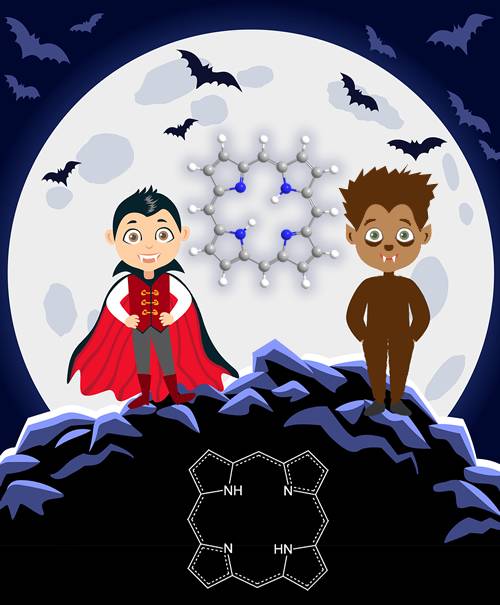What molecule am I?

Porphine (also called porphin) is a planar aromatic heterocyclic compound with a 12-carbon outside ring and four embedded pyrrole rings. It is a dark red crystalline solid that is soluble in some polar solvents such as pyridine and dioxane. It can be heated to 360 ºC without melting.
Porphine was first prepared by German chemists Hans Fischer and Wilhelm Gleim in 1935. It is the parent structure of a large family of natural compounds called porphyrins, many of which are essential to life. Fischer was a 1930 Nobel Prize winner for his research on two porphyrins, heme (a constituent of hemoglobin) and chlorophyll. These porphyrins, like many others, contain a metal atom coordinated to the four nitrogen atoms.
Porphyria is a group of rare and often serious hereditary diseases in which the body is deficient in enzymes that modulate its proper distribution of porphyrins. Acute porphyrias cause significant damage to the nervous and digestive systems.
Less serious forms of the disease affect the skin, mostly in combination with sun exposure. Porphyrins are photosensitive, so exposure to intense light causes the skin to blister and burn—and sometimes turn red or purple.
So how does Halloween fit in with porphine, porphyrins, and porphyria? The combination of skin coloration and mental problems caused by porphyrias is, some have conjectured, the basis of vampire and werewolf folklore in central and eastern Europe. These theories have been largely debunked, but vampires and their kin live on, especially in TV series and Halloween costumes.

Learn more about this molecule from CAS, the most authoritative and comprehensive source for chemical information.
Molecule of the Week needs your suggestions!
If your favorite molecule is not in our archive, please send us a message. The molecule can be notable for its current or historical importance or for any quirky reason. Thank you!
Stay Ahead of the Chemistry Curve
Learn how ACS can help you stay ahead in the world of chemistry.

